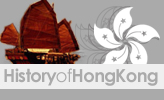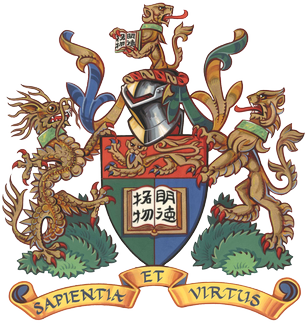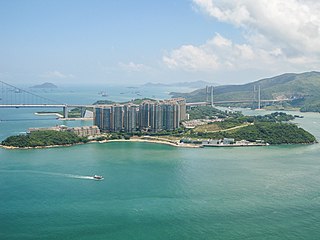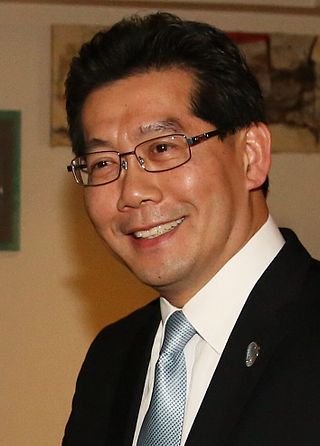| This article is part of a series on the |
| History of Hong Kong |
|---|
 |
| Timeline |
|
| By topic |
The following is a timeline of the history of Hong Kong .
| This article is part of a series on the |
| History of Hong Kong |
|---|
 |
| Timeline |
|
| By topic |
The following is a timeline of the history of Hong Kong .
| Date | Ruling entity | Events | Other people/events |
|---|---|---|---|
| 221 BC | Qin Dynasty | First records of the territory in Chinese history | |
| 206 BC | Han Dynasty | Inhabitants in Ma Wan Island | |
| 25 AD | Building of Lei Cheng Uk Han Tomb (est.) | ||
| 901 AD | Punti settlement | ||
| 1075 | Song Dynasty | Founding of Li Ying College | |
| 1163 | Salt fields in Hong Kong first officially managed | ||
| 1277 | China's Imperial court found refuge in Silvermine Bay on Lantau Island during the Battle of Yamen | ||
| 1513 | Ming Dynasty | Jorge Álvares arrives in Tuen Mun | |
| 1521 | Battle of Tunmen | ||
| 1562 | Battle of Sincouwaan | ||
| 1661 | Qing Dynasty | Kangxi Emperor orders the Great Clearance, which requires the evacuation of the coastal areas of Guangdong. What is now the territory of Hong Kong became largely wasteland during the ban. [1] | |
| 1669 | The coastal ban is lifted | ||
| 1685 | Kangxi Emperor opens limited trade on a regular basis starting with Canton | ||
| 1757 | British East India Company pursued a monopoly on opium production beginning with India in the far east | ||
| 1793 | Anglo-Chinese relations | ||
| 1839 | Battle of Kowloon | First Opium War (1839–42) |

Hong Kong is a special administrative region of the People's Republic of China. With 7.4 million residents of various nationalities in a 1,104-square-kilometre (426 sq mi) territory, Hong Kong is one of the most densely populated territories in the world.

Sir Charles Kao Kuen was a Chinese physicist and Nobel laureate who contributed to the development and use of fiber optics in telecommunications. In the 1960s, Kao created various methods to combine glass fibers with lasers in order to transmit digital data, which laid the groundwork for the evolution of the Internet.

The Government of the Hong Kong Special Administrative Region, commonly known as the Hong Kong Government or HKSAR Government, is the executive authorities of Hong Kong. It was formed on 1 July 1997 in accordance with the Sino-British Joint Declaration of 1983, an international treaty lodged at the United Nations. This government replaced the former British Hong Kong Government (1842–1997). The Chief Executive and the principal officials are appointed by the State Council of the People's Republic of China. The Government Secretariat is headed by the Chief Secretary of Hong Kong, who is the most senior principal official of the Government. The Chief Secretary and the other secretaries jointly oversee the administration of Hong Kong, give advice to the Chief Executive as members of the Executive Council, and are accountable for their actions and policies to the Chief Executive and the Legislative Council.

The University of Hong Kong (HKU) is a public research university in Pok Fu Lam, Hong Kong Island, Hong Kong.

The Hong Kong University of Science and Technology (HKUST) is a public research university in Clear Water Bay Peninsula, New Territories, Hong Kong. Founded in 1991, it was the territory's third institution to be granted university status.

Ma Wan is an island of Hong Kong, located between Lantau Island and Tsing Yi Island, with an area of 0.97 square kilometres. Administratively, it is part of Tsuen Wan District.

The Election Committee is a Hong Kong electoral college, the function of which is to select the Chief Executive (CE) and, since 2021, to elect 40 of the 90 members of the Legislative Council. Established by Annex I of the Basic Law of Hong Kong which states that "the Chief Executive shall be elected by a broadly representative Election Committee in accordance with this Law and appointed by the Central People's Government ." It is formed and performs its selection function once every five years, even in the event of a CE not completing their term. The membership of the Election Committee was expanded to 1,500 under the massive overhaul of the electoral system in 2021. The Election Committee has been criticised for its "small-circle" electoral basis and its composition favouring pro-Beijing and business interests.

Hong Kong's Department of Health is responsible for healthcare policies and the provision of basic healthcare services and established in 1939. The public hospitals are managed by the department's Hospital Authority. The department reports to the Health Bureau.

The Hong Kong Red Cross is the national Red Cross society of Hong Kong as part of the International Red Cross and Red Crescent Movement. Its head office is in West Kowloon.

Fanling Lodge is an official residence of the Chief Executive of Hong Kong, which serves as a country house and occasionally hosts official functions. Built in 1934 as a summer residence for the then Governor of Hong Kong, Fanling Lodge was granted a Grade I historic building status in 2014, amid concerns about its inclusion within a new town development plan.

The Transport Department of the Government of Hong Kong is a department of the civil service responsible for transportation-related policy in Hong Kong. The department is under the Transport and Logistics Bureau.

Gregory So Kam-leung is the former Secretary for Commerce and Economic Development of Hong Kong.

The Hong Kong and Macau Work Office, concurrently known as the Hong Kong and Macao Affairs Office of the State Council (HMO), is an administrative office of the Central Committee of the Chinese Communist Party responsible for promoting cooperation and coordination of political, economic, and cultural ties between mainland China and the Chinese Special Administrative Regions of Hong Kong and Macau. It was formed in 2023 on the basis of then State Council's HKMAO. Its head office is in Xicheng District, Beijing.

The Lung Tsun Stone Bridge was a bridge in British Hong Kong which was buried during the construction of Kai Tak Airport and which connected the Kowloon Walled City to a pier leading into Kowloon Bay.
Wong & Ouyang (HK) Ltd. is an architectural and engineering practice based in Hong Kong, with branch offices in Shanghai and Guangzhou.

Tsuen Wan Transport Complex was a large transport hub in Tsuen Wan, Hong Kong. There was a bus terminus and taxi stand on the ground floor; on top sat a multi-storey car park.
The visual art of Hong Kong, or Hong Kong art, refers to all forms of visual art in or associated with Hong Kong throughout its history and towards the present. The history of Hong Kong art is closely related to the broader history of Chinese art, alongside the art of Taiwan and Macau. Hong Kong art may include pottery and rock art from Hong Kong's prehistoric periods; calligraphy, Chinese ink painting, and pottery from its time under Imperial China; paintings from the New Ink Painting Movement and avant-garde art emerging during Hong Kong's colonial period; and the contemporary art practices in post-handover Hong Kong today.

The 2021 Hong Kong electoral changes were initiated by the National People's Congress (NPC) on 11 March 2021 to "amend electoral rules and improve the electoral system" of the Hong Kong Special Administrative Region (HKSAR) for its Chief Executive (CE) and the Legislative Council (LegCo), in order to ensure a system in which only "patriots", according to the Chinese definition, govern Hong Kong. The reforms have been widely criticized for their negative impact on the democratic representation in the Hong Kong legislature.